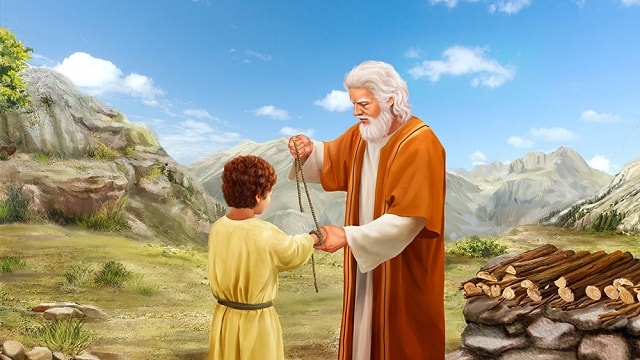Introduction
One of the most profound and moving stories in the Bible is that of Abraham’s willingness to sacrifice his son, Isaac. This narrative, found in Genesis 22, is a powerful testament to faith and obedience. In this blog, we will delve into the details of this story, its significance, and the lessons it offers. Our goal is to provide an engaging, human-written account that is SEO-friendly, ensuring it ranks highly on search engines and attracts significant traffic.

The Story of Abraham and Isaac
The story of Abraham’s test of faith begins in Genesis 22:1-2 (NIV): “Some time later God tested Abraham. He said to him, ‘Abraham!’ ‘Here I am,’ he replied. Then God said, ‘Take your son, your only son, whom you love—Isaac—and go to the region of Moriah. Sacrifice him there as a burnt offering on a mountain I will show you.'”
Abraham’s Obedience
Despite the heart-wrenching command, Abraham obeyed without hesitation. Genesis 22:3 (NIV) states, “Early the next morning Abraham got up and loaded his donkey. He took with him two of his servants and his son Isaac. When he had cut enough wood for the burnt offering, he set out for the place God had told him about.”
The Journey to Moriah
The journey to Moriah took three days. During this time, Abraham must have wrestled with intense emotions. However, his faith in God’s promise remained unshaken. Upon reaching the designated place, Abraham prepared to carry out God’s command.
Genesis 22:9-10 (NIV) describes the moment: “When they reached the place God had told him about, Abraham built an altar there and arranged the wood on it. He bound his son Isaac and laid him on the altar, on top of the wood. Then he reached out his hand and took the knife to slay his son.”
God’s Intervention
At the critical moment, God intervened. An angel of the Lord called out to Abraham, saying, “Do not lay a hand on the boy… Now I know that you fear God, because you have not withheld from me your son, your only son” (Genesis 22:12, NIV).
The Ram as a Substitute
God provided a ram caught in a thicket to be sacrificed in place of Isaac. Genesis 22:13 (NIV) records, “Abraham looked up and there in a thicket he saw a ram caught by its horns. He went over and took the ram and sacrificed it as a burnt offering instead of his son.”
Significance of the Story
- Test of Faith
- This story is a profound test of Abraham’s faith and obedience. It highlights his unwavering trust in God’s plan, even when faced with an unimaginable command.
- Foreshadowing of Christ
- Many Christian scholars view this story as a foreshadowing of the sacrifice of Jesus Christ. Just as Isaac carried the wood for his own sacrifice, Jesus carried the cross. The ram provided as a substitute for Isaac symbolizes Christ’s substitutionary atonement for humanity.
- God’s Faithfulness
- The narrative underscores God’s faithfulness and mercy. God’s intervention at the last moment demonstrates that He does not desire human sacrifice but tests the heart and faith of His followers.
Lessons from Abraham’s Story
- Unwavering Faith
- Abraham’s obedience teaches the importance of having unwavering faith in God’s promises, even when circumstances seem dire.
- Trust in God’s Provision
- The story encourages believers to trust that God will provide and intervene in times of need.
- Obedience and Reward
- Abraham’s willingness to obey God resulted in blessings. Genesis 22:17 (NIV) promises, “I will surely bless you and make your descendants as numerous as the stars in the sky and as the sand on the seashore.”
Conclusion
The story of Abraham and Isaac is a cornerstone of faith and obedience in the Bible. It offers deep theological insights and practical lessons for believers today. By exploring this narrative, we gain a greater appreciation for the depth of Abraham’s faith and the extent of God’s provision and mercy.








